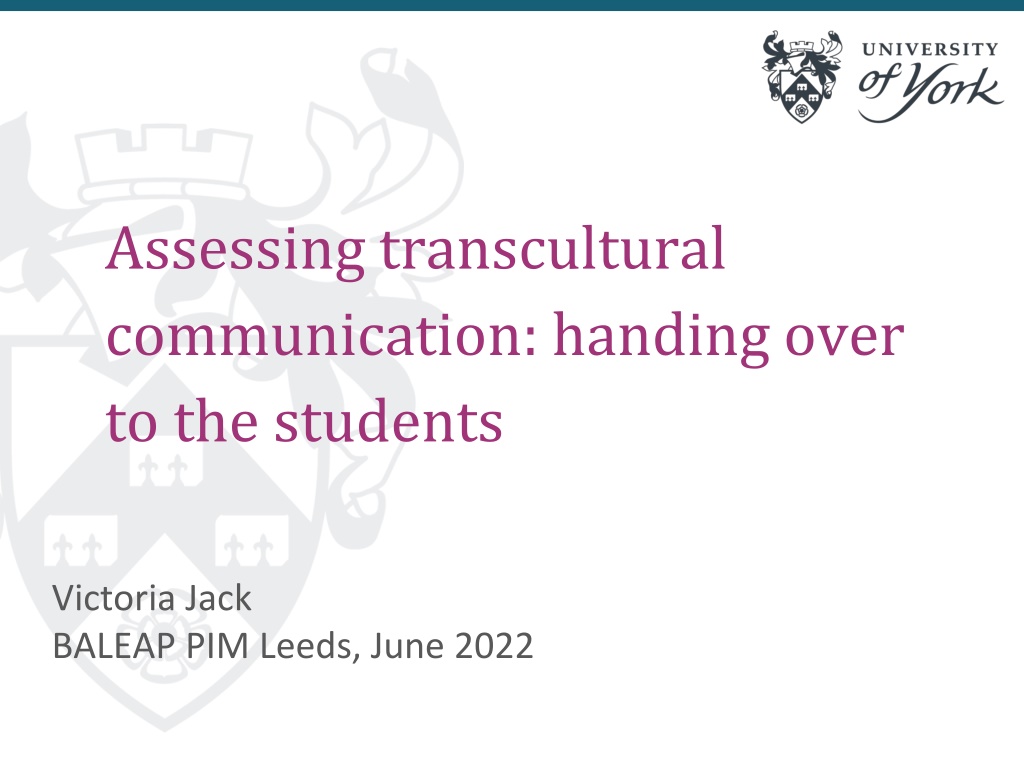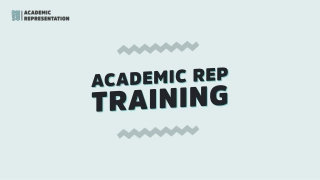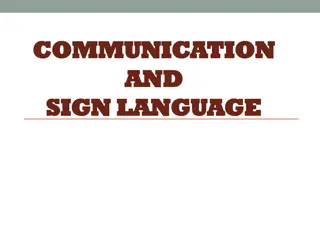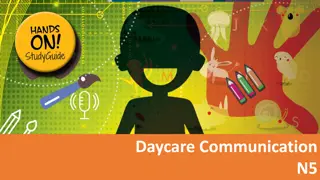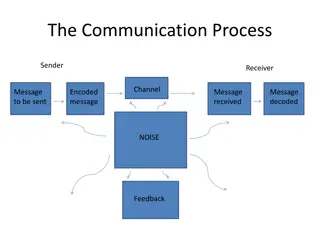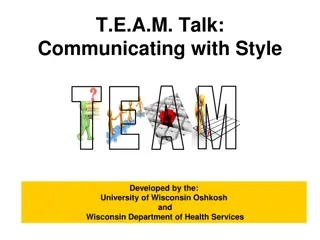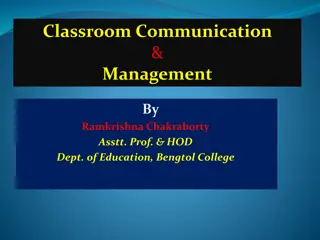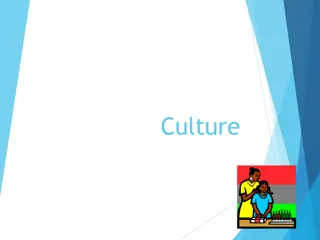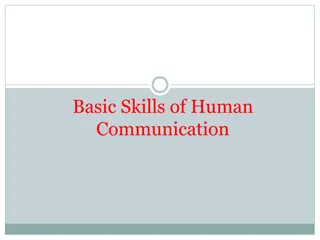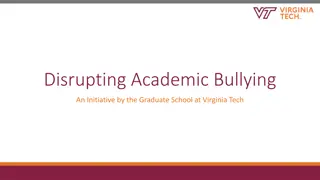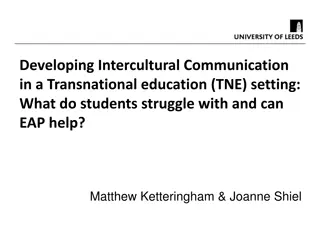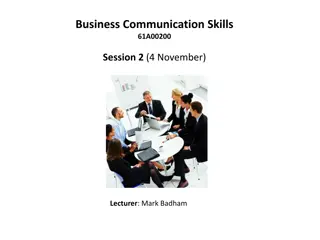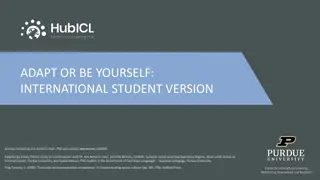Enhancing Transcultural Communication Skills in Academic Settings
Explore the significance of transcultural communication in academic environments, focusing on building assessment criteria, sharing experiences, and fostering effective communication among students from diverse backgrounds. Discover the importance of assessing and evaluating transcultural communication competencies through practical modules and discussions. Learn how to empower students to engage in effective transcultural communication through collaboration and reflection.
Download Presentation

Please find below an Image/Link to download the presentation.
The content on the website is provided AS IS for your information and personal use only. It may not be sold, licensed, or shared on other websites without obtaining consent from the author. Download presentation by click this link. If you encounter any issues during the download, it is possible that the publisher has removed the file from their server.
E N D
Presentation Transcript
Assessing transcultural communication: handing over to the students Victoria Jack BALEAP PIM Leeds, June 2022
Outline: A tiny bit of context: the conversation Building assessment criteria Sharing and reflection
What is transcultural communication? Transcultural communication, in keeping with trans- perspectives, is characterised here as communication where interactants move through and across, rather than in- between, cultural and linguistic boundaries, thus, named languages and cultures can no longer be taken for granted and in the process borders become blurred, transgressed and transcended. Baker (2019: 472) A medium for transcending cultural boundaries and dissolving power structures
Why assess TC?: the conversation Staff/confident students: My students/classmates don t take part in seminars. It s their English, can you help? Me: Can I observe?......(later), it s not their English, it s everyone s lack of transcultural communication competence. Staff: Can you teach that? Can you do a module on it? Me: I think so.
Why evaluate it? Module requirement: theory into practice 1) Group Discussion (15 mins): 33%- 3 module participants and 3 guests Student generated task (example): The University is interested in encouraging students from all different backgrounds to socialise and study together (integration). Discuss your experiences of socialising and studying with students from other backgrounds here at the university. Have you mixed with students from other countries, cultures, social backgrounds? To what extent? Then, suggest some things the university could do to improve integration. 1) Self evaluation & reflection on performance in group discussion: 33% 1750 words 2) Group evaluation 34% 1750 words: analysis of other participants performance in the group discussion
Handing over to the students Question: What is effective transcultural communication? The answer: Ask the student How: 1) Echo the process of departmental criteria development 2) Participant collaboration and negotiation
How its done in the module 1) Individually: students complete an assessment grid with categories and descriptors at strong pass and fail levels 2) In pairs, then groups of four and then eight, students agree categories 3) In groups of three or four, students write the descriptors for one category at strong pass and fail levels 4) A different group then writes descriptors at 2:1, 2:2 and 3rd levels 5) A different group then checks across the levels to ensure consistency IT TAKES A WHILE .2-4 hours
Your turn: Categories Think individually about communication in groups of people from diverse backgrounds. What constitutes good or bad communication? Which categories would you use to assess transcultural communication? bit.ly/JunBALEAP Add them to the assessment grid
In pairs: Categories Share which categories you have chosen to assess transcultural communication? Are they the same/different? Can you conflate them? Do they change as you are now involved in TC In fours: Categories As above In groups of eight: bit.ly/JunBALEAP As above
Your turn: Descriptors Using your categories, share them between group member (so each group member has a category) and each write a descriptor for a 1st and a fail for each category bit.ly/JunBALEAP
FEEDBACK Which categories did you choose? Add them to the menti
FEEDBACK Which categories did you choose? Add them to the menti REFLECTIONS What are your thoughts/experiences
LINK to criteria generated by the 2019 cohort Listening Engagement Openness/Sensitivity Clear communication 70+ First Class Consistently uses appropriate eye contact Consistently uses engaged and open body language. Appropriate and consistent use of gestures and nodding Concise understanding of reading the room and awareness of not interrupting when it disrupts communication Consistent use of turn taking and adapting to others contributions to create a balanced conversation Consistently asks relevant and appropriate questions to the group When contributing, consistently and appropriately contributes meaningfully with detailed content. Effectively builds on points presented in the discussion Consistently ready to communicate with others Always open for correction Consistently accepting of linguistic and grammatical errors Consistently accepts difference in individual personal values and culture differences Consistently shows great interest in other cultures As speaker: Consistently speaks clearly and at an appropriate pace Consistently doesn't use idiomatic (exclusive) language As listener: Consistently requests clarification when needed and does not move on when not understanding something
Shameless plug/plea My PhD research: 35 assessment grids into 1 The need to establish its usefulness Use of the grid to evaluate and standardise victoria.jack@york.ac.uk
Useful resources: Altbach, P & Knight, J. (2007) The Internationalization of Higher Education: Motivations and Realities, Journal of Studies in International Education Fall/Winter 2007 vol. 11 no. 3-4 290-305 Baker, W., & Sangiamchit, C. (2019). Transcultural communication: Language, communication and culture through English as a lingua franca in a social network community. Language and Intercultural Communication, 19(6), 471-487. https://doi.org/10.1080/14708477.2019.1606230 Bloxholm, S. & Boyd, P. (2007) Developing Effective Assessment in Higher Education: A Practical Guide, Maidenhead: OUP McGraw Hill Education Bloxham, S. & West , A. (2004) Understanding the rules of the game: marking peer assessment as a medium for developing students' conceptions of assessment, Assessment & Evaluation in Higher Education Volume 29 , Issue 6 , 2004, pgs 721-733 Elwood , J. & Klenowski , V. (2002) Creating Communities of Shared Practice: The challenges of assessment use in learning and teaching, Assessment & Evaluation in Higher Education, Volume 27 , Issue 3 , 2002 pgs 243-256 Higher Education Academy (HEA), A Marked Improvement, Transforming assessment in higher https://www.heacademy.ac.uk/sites/default/files/a_marked_improvement.pdf, accessed March 22nd 2016. Hyland, F., Trahar, S., Anderson, J. and Dickens, A. 2008. A changing world: The internationalisation experiences of staff and students (home and international) in UK higher education (ESCalate & LLAS report). Retrieved February 23, 2010, from: http://escalate.ac.uk/downloads/5248.pdf Rust, C. , Price, M. and O Donovan, B., (2003) Improving Students' Learning by Developing their Understanding of Assessment Criteria and Processes, Assessment & Evaluation in Higher Education, 28:2, 147-164, DOI: 10.1080/02602930301671 education. Available at
